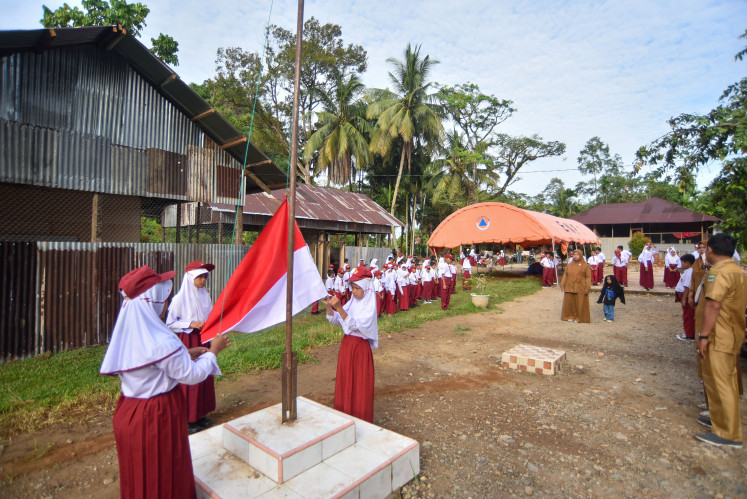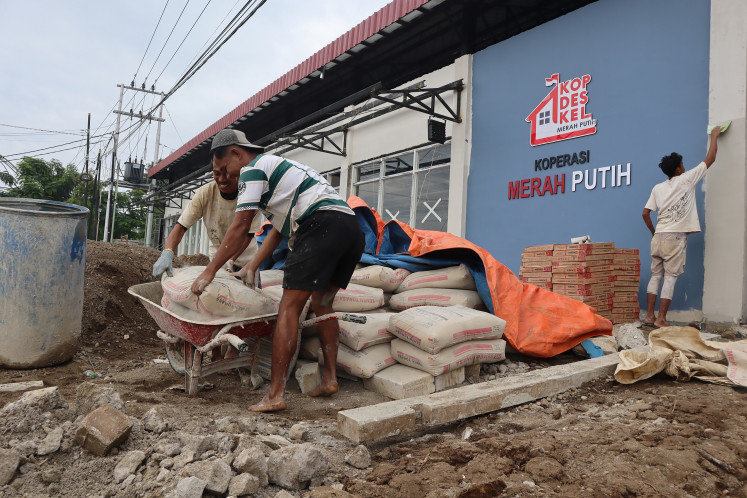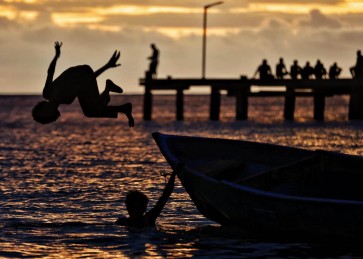Popular Reads
Top Results
Can't find what you're looking for?
View all search resultsPopular Reads
Top Results
Can't find what you're looking for?
View all search resultsInsight: Acknowledge child soldiers to save Papua’s children
Studies and reports on the growing number of child soldiers in Asia, including in Indonesia’s Papua, are still lacking. However, some international media spotted the growing use of under 18-year-olds in Papua recently.
Change text size
Gift Premium Articles
to Anyone
B
lood Diamond, a 2006 Hollywood blockbuster, depicts how the illicit economic activity to secure diamonds in Sierra Leone involved conflicting domestic and international groups. The film vividly depicts a rebel group abducting children and transforming them into deadly soldiers. In many armed conflicts and civilian wars, children are not only victims but also active participants who likely prolong the conflict. Much scholarly work has scrutinized such phenomena in Africa. However, other areas also have the emerging role of child soldiers in conflicts, although they are less known such as in Papua.
The 2018 United Nations annual report on children and armed conflicts exhibits the rise of child soldiers in 17 countries compared to 15 countries in 2013. Most of the child soldiers operate in African and Middle Eastern countries. Studies and reports on the growing number of child soldiers in Asia, including in Indonesia’s Papua, are still lacking. One reason is due to the highly restricted access for humanitarian work in conflict areas in this region. However, some international media spotted the growing use of under 18-year-olds in Papua recently. A photo describing some children holding guns drew concerns over the violation of international laws on recruiting and deploying children in the ongoing armed conflict in Nduga.
This armed conflict is another example of how the central government has presumably overlooked the fact that child soldiers exist in a conflict area, such as Papua. The province’s complex problems range from conflicting historical perspectives and human rights to development policies — and the use of children as part of the armed conflict in Indonesia’s easternmost area may be the most understudied issue.
My interviews and data collection on the ground suggest that some armed groups have been using children since 2015, such as in Lanny Jaya and Nduga regencies. Compared to the African warlords who use children mainly through abduction, I found that children in Papua voluntarily joined the pro-independence West Papua National Liberation Army (TPN-PB).
Another critical difference is that most African warring parties can access financial resources, which can lure children’s loyalty. The scattered pro-independence groups in Papua lack material resources, yet the shared communal identity or ideology can bind the children’s loyalty. Nevertheless, the African and Papuan child soldiers are similarly exposed to a conflict environment or have been trapped in conflict zones from a very young age.
Repression, intimidation, discrimination, lack of education and poor living conditions are push factors that drive these children out of their environment or communities. Such factors have been common among indigenous Papuans. On the contrary, a shared ideology and group identity have helped to attract children to be part of the pro-independence group led by Egianus Kogeya in Nduga. Egianus himself reportedly took up arms against security officers when he was 17 years old. By joining the group, the children shared the same political ideology of independence.
I encountered a displaced boy from Nduga who spontaneously shared his anger living in Wamena with thousands of internally displaced persons (IDPs) lacking basic supplies and his worry about his future. He only wanted to return to his village, yet it wasn’t safe. The boy was presumably willing to join the pro-independence group because he had witnessed some of his relatives die in the jungle after security officers allegedly raided his village.


















